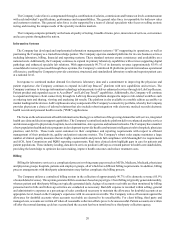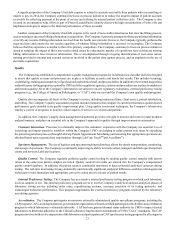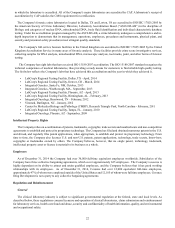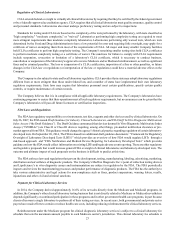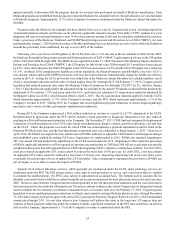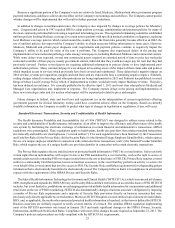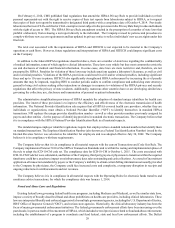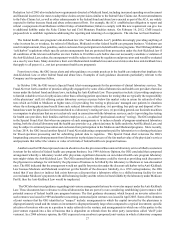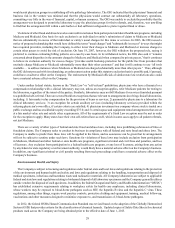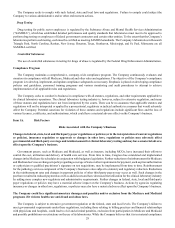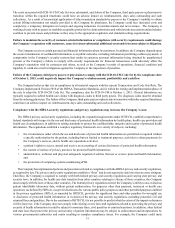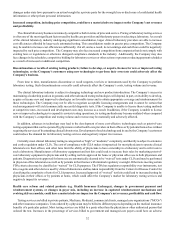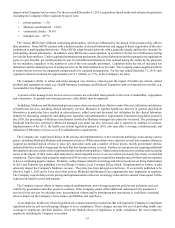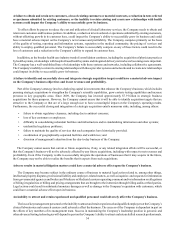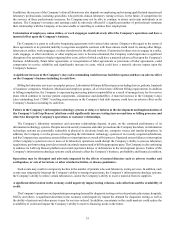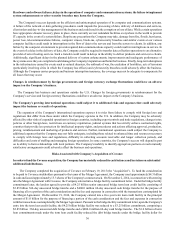LabCorp 2014 Annual Report Download - page 29
Download and view the complete annual report
Please find page 29 of the 2014 LabCorp annual report below. You can navigate through the pages in the report by either clicking on the pages listed below, or by using the keyword search tool below to find specific information within the annual report.27
Reduction Act of 2005 also included new requirements directed at Medicaid fraud, including increased spending on enforcement
and financial incentives for states to adopt false claims act provisions similar to the federal False Claims Act. Recent amendments
to the False Claims Act, as well as other enhancements to the federal fraud and abuse laws enacted as part of the ACA, are widely
expected to further increase fraud and abuse enforcement efforts. For example, the ACA established an obligation to report and
refund overpayments from Medicare within 60 days of identification; failure to comply with this new requirement can give rise
to additional liability under the False Claims Act and Civil Monetary Penalties statute. On February 16, 2012, CMS issued a
proposed rule to establish regulations addressing the reporting and returning of overpayments. The rule has not been finalized.
The federal health care programs' anti-kickback law (the "Anti-Kickback Law") prohibits knowingly providing anything of
value in return for, or to induce, the referral of Medicare, Medicaid or other federal health care program business. Violations can
result in imprisonment, fines, penalties, and/or exclusion from participation in federal health care programs. The OIG has published
“safe harbor” regulations which specify certain arrangements that are protected from prosecution under the Anti-Kickback law if
all conditions of the relevant safe harbor are met. Failure to fit within a safe harbor does not necessarily constitute a violation of
the Anti-Kickback Law; rather, the arrangement would be subject to scrutiny by regulators and prosecutors and would be evaluated
on a case by case basis. Many states have their own Medicaid anti-kickback laws and several states also have anti-kickback laws
that apply to all payers (i.e., not just government health care programs).
From time to time, the OIG issues alerts and other guidance on certain practices in the health care industry that implicate the
Anti-Kickback Law or other federal fraud and abuse laws. Examples of such guidance documents particularly relevant to the
Company and its operations follow.
In October 1994, the OIG issued a Special Fraud Alert on arrangements for the provision of clinical laboratory services. The
Fraud Alert set forth a number of practices allegedly engaged in by some clinical laboratories and health care providers that raise
issues under the federal fraud and abuse laws, including the Anti-Kickback Law. These practices include: (i) providing employees
to furnish valuable services for physicians (other than collecting patient specimens for testing) that are typically the responsibility
of the physicians’ staff; (ii) offering certain laboratory services at prices below fair market value in return for referrals of other
tests which are billed to Medicare at higher rates; (iii) providing free testing to physicians’ managed care patients in situations
where the referring physicians benefit from such reduced laboratory utilization; (iv) providing free pick-up and disposal of bio-
hazardous waste for physicians for items unrelated to a laboratory’s testing services; (v) providing general-use facsimile machines
or computers to physicians that are not exclusively used in connection with the laboratory services; and (vi) providing free testing
for health care providers, their families and their employees (i.e., so-called “professional courtesy” testing). The OIG emphasized
in the Special Fraud Alert that when one purpose of such arrangements is to induce referrals of program-reimbursed laboratory
testing, both the clinical laboratory and the health care provider (e.g., physician) may be liable under the Anti-Kickback Law, and
may be subject to criminal prosecution and exclusion from participation in the Medicare and Medicaid programs. More recently,
in June 2014, the OIG issued another Special Fraud Alert addressing compensation paid by laboratories to referring physicians
for blood specimen processing and for submitting patient data to registries. This Special Fraud Alert reiterates the OIG's
longstanding concerns about payments from laboratories to physicians in excess of the fair market value of the physician's services
and payments that reflect the volume or value of referrals of federal health care program business.
Another issue the OIG has expressed concern about involves the provision of discounts on laboratory services billed to customers
in return for the referral of federal health care program business. In a 1999 Advisory Opinion, the OIG concluded that a proposed
arrangement whereby a laboratory would offer physicians significant discounts on non-federal health care program laboratory
tests might violate the Anti-Kickback Law. The OIG reasoned that the laboratory could be viewed as providing such discounts to
the physician in exchange for referrals by the physician of business to be billed by the laboratory to Medicare at non-discounted
rates. The OIG indicated that the arrangement would not qualify for protection under the discount safe harbor to the Anti-Kickback
Law because Medicare and Medicaid would not get the benefit of the discount. Similarly, in a 1999 correspondence, the OIG
stated that if any direct or indirect link exists between a discount that a laboratory offers to a skilled nursing facility for tests
covered under Medicare’s payments to the skilled nursing facility and the referral of tests billable by the laboratory under Medicare
Part B, then the Anti-Kickback Law would be implicated.
The OIG also has issued guidance regarding joint venture arrangements that may be viewed as suspect under the Anti-Kickback
Law. These documents have relevance to clinical laboratories that are part of (or are considering establishing) joint ventures with
potential sources of federal health care program business. The first guidance document, which focused on investor referrals to
such ventures was issued in 1989 and another concerning contractual joint ventures was issued in April 2003. Some of the elements
of joint ventures that the OIG identified as “suspect” include: arrangements in which the capital invested by the physicians is
disproportionately small and the return on investment is disproportionately large when compared to a typical investment; specific
selection of investors who are in a position to make referrals to the venture; and arrangements in which one of the parties to the
joint venture expands into a line of business that is dependent on referrals from the other party (sometimes called "shell" joint
ventures). In a 2004 advisory opinion, the OIG expressed concern about a proposed joint venture in which a laboratory company





